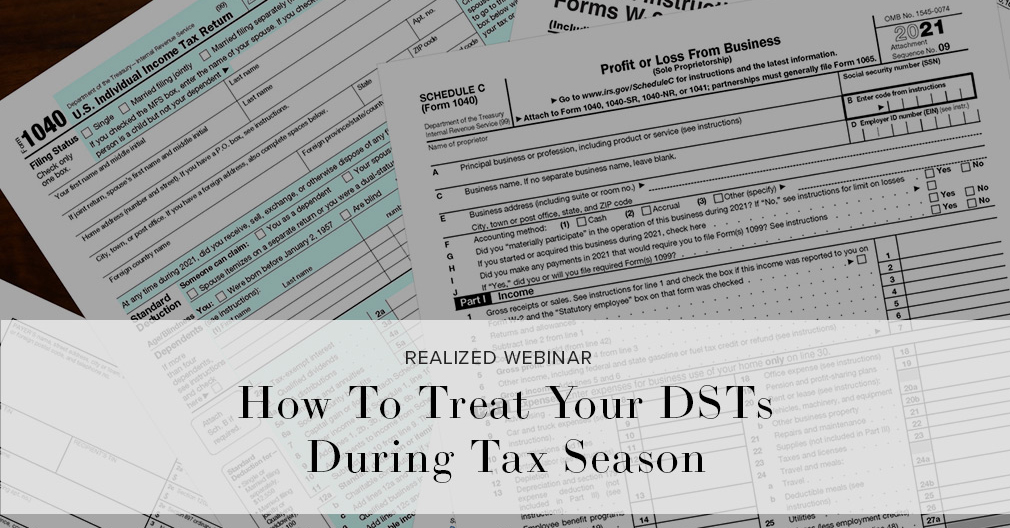Page 11 101 - 110 of 278
What is an Example of an Installment Sale?

Completing a 1031 exchange is a common way for real estate investors to defer capital gains tax liabilities on the sale of investment properties.
[Webinar Recap] How To Treat Your DSTs During Tax Season - Managing Income Tax and Cash Flow

Here at Realized, we help our clients use 1031 Exchanges to buy and sell real estate. 1031 Exchanges help investors legally defer capital gains taxes on real estate sales by exchanging one property for another like-kind property. In addition to direct real estate, one form of like-kind property investors can exchange into is a Delaware Statutory Trust, or DST. DSTs can be a tool for growing your real estate portfolio, but they can also be tricky to manage when tax season comes around.
What Happens If You Don't File Form 8824?

The 26 U.S. Code § 1031—”Exchange of Real Property Held for Productive Use or Investment”—can help defer any potential taxes levied on gains resulting from the sale of investment real estate. Swapping your relinquished property for a replacement property of equal or greater value can push your tax burden down the road at least, as long as you follow the IRS’ many rules regarding the like-kind exchange.
How to Report a Section 121 Exclusion

Section 121 of the Internal Revenue Code allows taxpayers to exclude from income some of the gains they have enjoyed due to the increase in value of a primary residence. The IRS rules are meant to support the exclusion by homeowners while denying it in the case of an investment property. To that end, taxpayers claiming the exclusion must satisfy both an ownership and use test.
Do I Have to File a 1099-R Form?

You will likely get a 1099-R form If you received a distribution from a retirement plan or a similar account like an annuity, pension, or insurance contract. The plan administrator is responsible for filing the 1099-R with the IRS and any required state or local governments. As the taxpayer you will also report the distribution on your income taxes.
Which States Do Not Have an Estate Tax?

When someone passes away, their assets might be transferred to beneficiaries. If over a certain amount, the transferred assets can be subject to a federal inheritance tax. And, sometimes, can incur an estate tax at the state level.
Is Money Received From an Eminent Domain Taxable?

One bright, sunny day you might hear a knock on the door. When you answer it, the local mail man hands you a certified letter, requiring your signature. You sign, take the letter and rip it open.
Is Form 8824 Required Every Year?

A 1031 exchange is a complex process. There are many rules to follow so that the exchange isn’t invalidated. Additionally, specific forms, such as form 8824, must be filed. The frequency and timing of filing for this form can vary depending on the taxpayer’s specific situation. In this article, we’ll look at form 8824 in more detail and discuss its filing requirements.
What is Ordinary Business Income?

For individuals and companies, categorizing income as ordinary instead of as a long-term capital gain may change the effective tax rate for that income. For most business types and individual taxpayers, the tax rate applied to long-term capital gains is lower than the rate used for ordinary income. Ordinary income is any income earned through operations. As with individuals, business income obtained from the disposition of a capital asset held for more than a year is taxed at the lower long-term capital gains rate.
Which States Have an Estate Tax?

Some states have an estate tax, which may apply to your assets upon your death. At the time of this writing, only twelve states and Washington, D.C., have an estate tax.
Page 11 101 - 110 of 278


